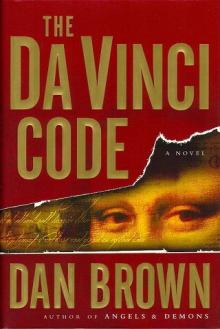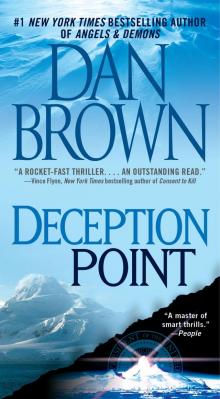Deception Point Read online
Page 2
The senator was apparently done with her anyway. He pulled out his cellphone to make a call. "'Bye, sweetie. Stop by the office one of these days and say hello. And get married, for God's sake. You're thirty-three years old."
"Thirty-four," she snapped. "Your secretary sent a card."
He clucked ruefully. "Thirty-four. Almost an old maid. You know by the time I was thirty-four, I'd already-"
"Married Mom and screwed the neighbor?" The words came out louder than Rachel had intended, her voice hanging naked in an ill-timed lull. Diners nearby glanced over.
Senator Sexton's eyes flash-froze, two ice-crystals boring into her. "You watch yourself, young lady."
Rachel headed for the door. No, you watch yourself, senator.
2
The three men sat in silence inside their ThermaTech storm tent. Outside, an icy wind buffeted the shelter, threatening to tear it from its moorings. None of the men took notice; each had seen situations far more threatening than this one.
Their tent was stark white, pitched in a shallow depression, out of sight. Their communication devices, transport, and weapons were all state-of-the-art. The group leader was code-named Delta-One. He was muscular and lithe with eyes as desolate as the topography on which he was stationed.
The military chronograph on Delta-One's wrist emitted a sharp beep. The sound coincided in perfect unison with beeps emitted from the chronographs worn by the other two men.
Another thirty minutes had passed.
It was time. Again.
Reflexively, Delta-One left his two partners and stepped outside into the darkness and pounding wind. He scanned the moonlit horizon with infrared binoculars. As always, he focused on the structure. It was a thousand meters away — an enormous and unlikely edifice rising from the barren terrain. He and his team had been watching it for ten days now, since its construction. Delta-One had no doubt that the information inside would change the world. Lives already had been lost to protect it.
At the moment, everything looked quiet outside the structure.
The true test, however, was what was happening inside.
Delta-One reentered the tent and addressed his two fellow soldiers. "Time for a flyby."
Both men nodded. The taller of them, Delta-Two, opened a laptop computer and turned it on. Positioning himself in front of the screen, Delta-Two placed his hand on a mechanical joystick and gave it a short jerk. A thousand meters away, hidden deep within the building, a surveillance robot the size of a mosquito received his transmission and sprang to life.
3
Rachel Sexton was still steaming as she drove her white Integra up Leesburg Highway. The bare maples of the Falls Church foothills rose stark against a crisp March sky, but the peaceful setting did little to calm her anger. Her father's recent surge in the polls should have endowed him with a modicum of confident grace, and yet it seemed only to fuel his self-importance.
The man's deceit was doubly painful because he was the only immediate family Rachel had left. Rachel's mother had died three years ago, a devastating loss whose emotional scars still raked at Rachel's heart. Rachel's only solace was knowing that the death, with ironic compassion, had liberated her mother from a deep despair over a miserable marriage to the senator.
Rachel's pager beeped again, pulling her thoughts back to the road in front of her. The incoming message was the same.
— RPRT DIRNRO STAT—
Report to the director of NRO stat. She sighed. I'm coming, for God's sake!
With rising uncertainty, Rachel drove to her usual exit, turned onto the private access road, and rolled to a stop at the heavily armed sentry booth. This was 14225 Leesburg Highway, one of the most secretive addresses in the country.
While the guard scanned her car for bugs, Rachel gazed out at the mammoth structure in the distance. The one-million-square-foot complex sat majestically on sixty-eight forested acres just outside D.C. in Fairfax, Virginia. The building's facade was a bastion of one-way glass that reflected the army of satellite dishes, antennas, and rayodomes on the surrounding grounds, doubling their already awe-inspiring numbers.
Two minutes later, Rachel had parked and crossed the manicured grounds to the main entrance, where a carved granite sign announced
NATIONAL RECONNAISSANCE OFFICE (NRO)
The two armed Marines flanking the bulletproof revolving door stared straight ahead as Rachel passed between them. She felt the same sensation she always felt as she pushed through these doors… that she was entering the belly of a sleeping giant.
Inside the vaulted lobby, Rachel sensed the faint echoes of hushed conversations all around her, as if the words were sifting down from the offices above. An enormous tiled mosaic proclaimed the NRO directive:
ENABLING U.S. GLOBAL INFORMATION SUPERIORITY, DURING PEACE AND THROUGH WAR.
The walls here were lined with massive photographs — rocket launches, submarine christenings, intercept installations — towering achievements that could be celebrated only within these walls.
Now, as always, Rachel felt the problems of the outside world fading behind her. She was entering the shadow world. A world where the problems thundered in like freight trains, and the solutions were meted out with barely a whisper.
As Rachel approached the final checkpoint, she wondered what kind of problem had caused her pager to ring twice in the last thirty minutes.
"Good morning, Ms. Sexton." The guard smiled as she approached the steel doorway.
Rachel returned the smile as the guard held out a tiny swab for Rachel to take.
"You know the drill," he said.
Rachel took the hermetically sealed cotton swab and removed the plastic covering. Then she placed it in her mouth like a thermometer. She held it under her tongue for two seconds. Then, leaning forward, she allowed the guard to remove it. The guard inserted the moistened swab into a slit in a machine behind him. The machine took four seconds to confirm the DNA sequences in Rachel's saliva. Then a monitor flickered on, displaying Rachel's photo and security clearance.
The guard winked. "Looks like you're still you." He pulled the used swab from the machine and dropped it through an opening, where it was instantly incinerated. "Have a good one." He pressed a button and the huge steel doors swung open.
As Rachel made her way into the maze of bustling corridors beyond, she was amazed that even after six years here she was still daunted by the colossal scope of this operation. The agency encompassed six other U.S. installations, employed over ten thousand agents, and had operating costs of over $10 billion per year.
In total secrecy, the NRO built and maintained an astonishing arsenal of cutting-edge spy technologies: worldwide electronic intercepts; spy satellites; silent, embedded relay chips in telecomm products; even a global naval-recon network known as Classic Wizard, a secret web of 1,456 hydrophones mounted on seafloors around the world, capable of monitoring ship movements anywhere on the globe.
NRO technologies not only helped the United States win military conflicts, but they provided an endless stream of peacetime data to agencies such as the CIA, NSA, and Department of Defense, helping them thwart terrorism, locate crimes against the environment, and give policymakers the data needed to make informed decisions on an enormous array of topics.
Rachel worked here as a "gister." Gisting, or data reduction, required analyzing complex reports and distilling their essence or "gist" into concise, single-page briefs. Rachel had proven herself a natural. All those years of cutting through my father's bullshit, she thought.
Rachel now held the NRO's premier gisting post-intelligence liaison to the White House. She was responsible for sifting through the NRO's daily intelligence reports, deciding which stories were relevant to the President, distilling those reports into single-page briefs, and then forwarding the synopsized material to the President's National Security Adviser. In NRO-speak, Rachel Sexton "manufactured finished product and serviced the customer."
Although the job was difficult a
nd required long hours, the position was a badge of honor for her, a way to assert her independence from her father. Senator Sexton had offered many times to support Rachel if she would quit the post, but Rachel had no intention of becoming financially beholden to a man like Sedgewick Sexton. Her mother was testimony to what could happen when a man like that held too many cards.
The sound of Rachel's pager echoed in the marble hall.
Again? She didn't even bother to check the message.
Wondering what the hell was going on, she boarded the elevator, skipped her own floor, and went straight to the top.
4
To call the NRO director a plain man was in itself an overstatement. NRO Director William Pickering was diminutive, with pale skin, a forgettable face, a bald head, and hazel eyes, which despite having gazed upon the country's deepest secrets, appeared as two shallow pools. Nonetheless, to those who worked under him, Pickering towered. His subdued personality and unadorned philosophies were legendary at the NRO. The man's quiet diligence, combined with his wardrobe of plain black suits, had earned him the nickname the "Quaker." A brilliant strategist and the model of efficiency, the Quaker ran his world with an unrivaled clarity. His mantra: "Find the truth. Act on it."
When Rachel arrived in the director's office, he was on the phone. Rachel was always surprised by the sight of him: William Pickering looked nothing like a man who wielded enough power to wake the President at any hour.
Pickering hung up and waved her in. "Agent Sexton, have a seat." His voice had a lucid rawness to it.
"Thank you, sir." Rachel sat.
Despite most people's discomfort around William Pickering's blunt demeanor, Rachel had always liked the man. He was the exact antithesis of her father… physically unimposing, anything but charismatic, and he did his duty with a selfless patriotism, shunning the spotlight her father loved so much.
Pickering removed his glasses and gazed at her. "Agent Sexton, the President called me about a half hour ago. In direct reference to you."
Rachel shifted in her seat. Pickering was known for getting to the point. One hell of an opening, she thought. "Not a problem with one of my gists, I hope."
"On the contrary. He says the White House is impressed with your work."
Rachel exhaled silently. "So what did he want?"
"A meeting with you. In person. Immediately."
Rachel's unease sharpened. "A personal meeting? About what?"
"Damn good question. He wouldn't tell me."
Now Rachel was lost. Keeping information from the director of the NRO was like keeping Vatican secrets from the Pope. The standing joke in the intelligence community was that if William Pickering didn't know about it, it hadn't happened.
Pickering stood, pacing now in front of his window. "He asked that I contact you immediately and send you to meet with him."
"Right now?"
"He sent transportation. It's waiting outside."
Rachel frowned. The President's request was unnerving on its own account, but it was the look of concern on Pickering's face that really worried her. "You obviously have reservations."
"I sure as hell do!" Pickering showed a rare flash of emotion. "The President's timing seems almost callow in its transparency. You are the daughter of the man who is currently challenging him in the polls, and he demands a private meeting with you? I find this highly inappropriate. Your father no doubt would agree."
Rachel knew Pickering was right — not that she gave a damn what her father thought. "Do you not trust the President's motives?"
"My oath is to provide intel support to the current White House administration, not pass judgment on their politics."
Typical Pickering response, Rachel realized. William Pickering made no bones about his view of politicians as transitory figureheads who passed fleetingly across a chessboard whose real players were men like Pickering himself — seasoned "lifers" who had been around long enough to understand the game with some perspective. Two full terms in the White House, Pickering often said, was not nearly enough to comprehend the true complexities of the global political landscape.
"Maybe it's an innocent request," Rachel offered, hoping the President was above trying some sort of cheap campaign stunt. "Maybe he needs a reduction of some sensitive data."
"Not to sound belittling, Agent Sexton, but the White House has access to plenty of qualified gisting personnel if they need it. If it's an internal White House job, the President should know better than to contact you. And if not, then he sure as hell should know better than to request an NRO asset and then refuse to tell me what he wants it for."
Pickering always referred to his employees as assets, a manner of speech many found disconcertingly cold.
"Your father is gaining political momentum," Pickering said. "A lot of it. The White House has got to be getting nervous." He sighed. "Politics is a desperate business. When the President calls a secret meeting with his challenger's daughter, I'd guess there's more on his mind than intelligence gists."
Rachel felt a distant chill. Pickering's hunches had an uncanny tendency to be dead on. "And you're afraid the White House feels desperate enough to introduce me into the political mix?"
Pickering paused a moment. "You are not exactly silent about your feelings for your father, and I have little doubt the President's campaign staff is aware of the rift. It occurs to me that they may want to use you against him somehow."
"Where do I sign up?" Rachel said, only half-joking.
Pickering looked unimpressed. He gave her a stern stare. "A word of warning, Agent Sexton. If you feel that your personal issues with your father are going to cloud your judgment in dealing with the President, I strongly advise that you decline the President's request for a meeting."
"Decline?" Rachel gave a nervous chuckle. "I obviously can't refuse the President."
"No," the director said, "but I can."
His words rumbled a bit, reminding Rachel of the other reason Pickering was called the "Quaker." Despite being a small man, William Pickering could cause political earthquakes if he were crossed.
"My concerns here are simple," Pickering said. "I have a responsibility to protect the people who work for me, and I don't appreciate even the vague implication that one of them might be used as a pawn in a political game."
"What do you recommend I do?"
Pickering sighed. "My suggestion is that you meet with him. Commit to nothing. Once the President tells you what the hell is on his mind, call me. If I think he's playing political hardball with you, trust me, I'll pull you out so fast the man won't know what hit him."
"Thank you, sir." Rachel sensed a protective aura from the director that she often longed for in her own father. "And you said the President already sent a car?"
"Not exactly." Pickering frowned and pointed out the window.
Uncertain, Rachel went over and gazed out in the direction of Pickering's outstretched finger.
A snub-nosed MH-60G PaveHawk helicopter sat idling on the lawn. One of the fastest choppers ever made, this PaveHawk was emblazoned with the White House insignia. The pilot stood nearby, checking his watch.
Rachel turned to Pickering in disbelief. "The White House sent a PaveHawk to take me fifteen miles into D.C.?"
"Apparently the President hopes you are either impressed or intimidated." Pickering eyed her. "I suggest you are neither."
Rachel nodded. She was both.
Four minutes later, Rachel Sexton exited the NRO and climbed into the waiting helicopter. Before she had even buckled herself in, the craft was airborne, banking hard across the Virginia woods. Rachel gazed out at the blur of trees beneath her and felt her pulse rising. It would have risen faster had she known this chopper would never reach the White House.
5
The frigid wind battered the fabric of the ThermaTech tent, but Delta-One hardly noticed. He and Delta-Three were focused on their comrade, who was manipulating the joystick in his hand with surgical dexterity. The screen
before them displayed a live video transmission from a pinpoint camera mounted aboard the microrobot.
The ultimate surveillance tool, Delta-One thought, still amazed every time they powered it up. Lately, in the world of micromechanics, fact seemed to be out-pacing fiction.
Micro Electro Mechanical Systems (MEMS) — microbots — were the newest tool in high-tech surveillance — "fly on the wall technology," they called it.
Literally.
Although microscopic, remote-controlled robots sounded like science fiction, in fact they had been around since the 1990s. Discovery magazine had run a cover story in May 1997 on microbots, featuring both "flying" and "swimming" models. The swimmers — nanosubs the size of salt grains — could be injected into the human bloodstream a la the movie Fantastic Voyage. They were now being used by advanced medical facilities to help doctors navigate arteries by remote control, observe live intravenous video transmissions, and locate arterial blockages without ever lifting a scalpel.
Contrary to intuition, building a flying microbot was even simpler business. The aerodynamics technology for getting a machine to fly had been around since Kitty Hawk, and all that remained had been the issue of miniaturization. The first flying microbots, designed by NASA as unmanned exploration tools for future Mars missions, had been several inches long. Now, however, advances in nanotechnology, lightweight energy-absorbent materials, and micromechanics had made the flying microbots a reality.
The true breakthrough had come from the new field biomimics — copying Mother Nature. Miniature dragonflies, as it turned out, were the ideal prototype for these agile and efficient flying microbots. The PH2 model Delta-Two was currently flying was only one centimeter long — the size of a mosquito — and employed a dual pair of transparent, hinged, silicon-leaf wings, giving it unparalleled mobility and efficiency in the air.
The microbot's refueling mechanism had been another breakthrough. The first microbot prototypes could only recharge their energy cells by hovering directly beneath a bright light source, not ideal for stealth or use in dark locales. The newer prototypes, however, could recharge simply by parking within a few inches of a magnetic field. Conveniently, in modern society, magnetic fields were ubiquitous and discreetly placed — power outlets, computer monitors, electric motors, audio speakers, cellphones — it seemed there was never any shortage of obscure recharging stations. Once a microbot had been introduced successfully into a locale, it could transmit audio and video almost indefinitely. The Delta Force's PH2 had been transmitting for over a week now with no trouble whatsoever.
Now, like an insect hovering inside a cavernous barn, the airborne microbot hung silently in the still air of the structure's massive central room. With a bird's-eye view of the space below, the microbot circled silently above unsuspecting occupants — technicians, scientists, specialists in numerous fields of study. As the PH2 circled, Delta-One spotted two familiar faces engaged in conversation. They would be a telling mark. He told Delta-Two to drop down and have a listen.
Manipulating the controls, Delta-Two switched on the robot's sound sensors, oriented the microbot's parabolic amplifier, and decreased the robot's elevation until it was ten feet over the scientists' heads. The transmission was faint, but discernible.
"I still can't believe it," one scientist was saying. The excitement in his voice had not diminished since his arrival here forty-eight hours ago.
The man with whom he was talking obviously shared the enthusiasm. "In your lifetime… did you ever think you would witness anything like this?"
"Never," the scientist replied, beaming. "It's all a magnificent dream."
Delta-One had heard enough. Clearly everything inside was proceeding as

 Angels & Demons
Angels & Demons Origin
Origin The Da Vinci Code
The Da Vinci Code Inferno
Inferno Deception Point
Deception Point Digital Fortress
Digital Fortress The Lost Symbol
The Lost Symbol Origin: (Robert Langdon Book 5)
Origin: (Robert Langdon Book 5) Angles & Demons
Angles & Demons Inferno: A Novel
Inferno: A Novel Angels & Demons rl-1
Angels & Demons rl-1 The Great Expectations School
The Great Expectations School The Lost Symbol rl-3
The Lost Symbol rl-3 Angels and Demons
Angels and Demons Inferno: Special Illustrated Edition: Featuring Robert Langdon
Inferno: Special Illustrated Edition: Featuring Robert Langdon